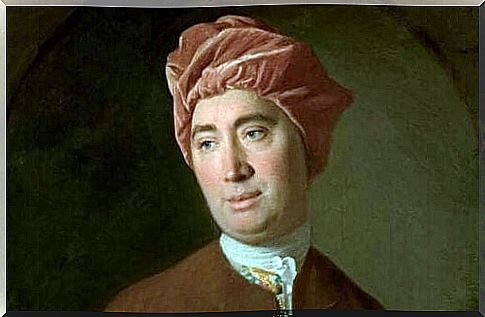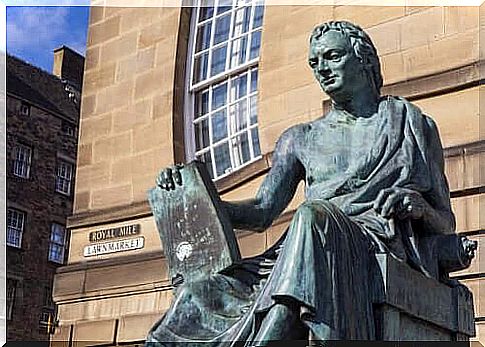David Hume: Empiricism, Thoughts And Work

David Hume was one of the great philosophers. He emphasized the importance of learning and the practice of establishing good habits. He was also concerned with people’s lack of innate primitive knowledge. Of course, this way of thinking was a trend of the time, and had a significant impact on philosophy. In addition, it also affected psychology, when it emerged about a century later.
Philosophy is a discipline that seeks to solve the mysteries of life and the world, as well as the causes behind our existence. Before science was established, humans tried to answer certain questions in very different ways. First of all, countless myths and ideas about creation arise. After that, much due to the emergence of philosophy, humanity’s reasoning became a little more objective.
Philosophy has always been concerned with finding reasons for existence and the nature of the world. Over time, philosophy was divided into different branches and disciplines. Philosophers have always dived into the way we humans perceive the reality around us.
To understand Hume’s philosophy, it is important that we also understand his background. In the Renaissance, two conflicting branches of philosophy related to knowledge emerged. One of these branches is rationalism. This theory claims that humans are born with certain universal truths that they use to interpret reality.
We find the exact opposite in the second branch, empiricism. The followers of this branch believed that humans had no kind of innate knowledge at all. As a consequence of this belief, they also believed that humans can only learn through experience. At this time, one of the most famous representatives of this branch was without a doubt David Hume. In this article we will discuss his life and work.

The life of David Hume
David Hume was born in Edinburgh, Scotland, in 1711. He came from a wealthy family. Ha’s father was a lawyer and died when Hume was still a child. His family expected him to follow in his father’s footsteps, and wanted him to study to become a lawyer. Hume studied at Edinburgh College. In fact, some of his professors were students of Sir Isaac Newton.
David eventually decided to fulfill his family’s wish for him, and began studying law at the University of Edinburgh. However, he quickly found out that there was nothing he liked and decided to end his studies. He then moved to Bristol to try his luck in the world of retail. But after a crisis, he decided that what he really wanted was to study philosophy.
France and Scotland
Several years later he traveled to France and lived there from 1735 to 1737. He lived first in Reims and later in Sarthe, formerly known as La Flèche. It was when he lived in these places that he wrote A Treatise of Human Nature , a work he published when he returned to England and London. This book reflects his faith and internal philosophy. However, this work was branded a failure, which led to him “fleeing” home to Scotland.
While living in Edinburgh, Hume published the first part of his work Essays, Moral, Political and Literary . Unlike his first release, this one was a huge success. Later he held several different positions. Among other things, he was a supervisor for Markien of Annandale, secretary of General St. Clair, and librarian at the Edinburgh Bar Association.
In 1763 he was employed by the embassy in Paris, thanks to the good help of Lord Hertford. In Paris, he established relationships with d’Alembert, Diderot and Jean-Jacques Rousseau. He extended his stay in the city until 1769. Later he decided to settle permanently at home in Edinburgh to focus on writing. He died in 1776.
David Hume and his philosophy
In order to truly understand Hume’s way of thinking, the first thing we must do is explore his work and try to define the empirical theory he always defended.
Empiricism is based on a number of principles:
Innate knowledge does not exist
Humans are not born with pre-existing thought patterns and knowledge that dictate how to interpret reality. For the empirical branch, everything we know about reality comes from our own experiences.
Experiences can be both internal or external, which means that they can come from one’s own reflections and knowledge of our inner life, but also quite the opposite, they can come from our experiences and our perception of the world we live in. For empiricists, is it does not come before experience. Empiricists believe that we learn through the tangible world and nothing else. The mind is like a blank canvas we fill up with the knowledge we acquire over time.
David Hume and John Locke believed in these ideas. Nevertheless, they varied in their opinions about where the boundaries of experience go. Locke believed that one can gain access to knowledge about realities beyond the practical. On the other hand, Hume has pointed out that knowledge is reduced to our perceptions, and with that he also takes into account the very nature of experiencing something.
There are two types of knowledge
According to Hume, there are two different types of knowledge: impressions and ideas. Impressions are the thoughts that arise as a consequence of experiencing something through our senses. Ideas, on the other hand, are abstract and ambiguous, since they do not come from physical experiences.
Everything arises from perception. Impression is the immediate knowledge we gain through our perception. Therefore, ideas are taken from impressions, which means that they will be much more complex in nature. Hume also talked about the concept of imagination, the human ability to modify and produce ideas.

There are two types of differentiated statements
David Hume differentiated between probable statements derived from a fact that may or may not occur in a particular space and time. For example, “One day the sun will not rise”. The sun rises every day. We have learned this knowledge through habit, perception and conviction. On the other hand, he talks about demonstrative statements that can be demonstrated due to their logical structure. For example: 4 + 4 = 8. Both statements build our habits, habits that will later also define our lifestyle.
His major works, such as A Teatrise of Human Nature , the aforementioned Essays, Moral, Political, and Literary and An Inquiry Concerning Human Understanding, reflected these basic principles.
David Hume and Psychology
In short, Daavid Hume is one of the most important empirical writers. Epistemology is one of the philosophical branches most associated with psychology. That is why Hume strongly influenced psychology in various areas.
For Hume, no people are born with pre-existing thoughts and emotions. Instead, they will develop them through their senses and experiences. Hume therefore rejected all ideas of “congenital” and worked to reinforce the idea of human learning. This author undoubtedly invites us to reflect on our perceptions, experiences and our way of understanding the world around us.









